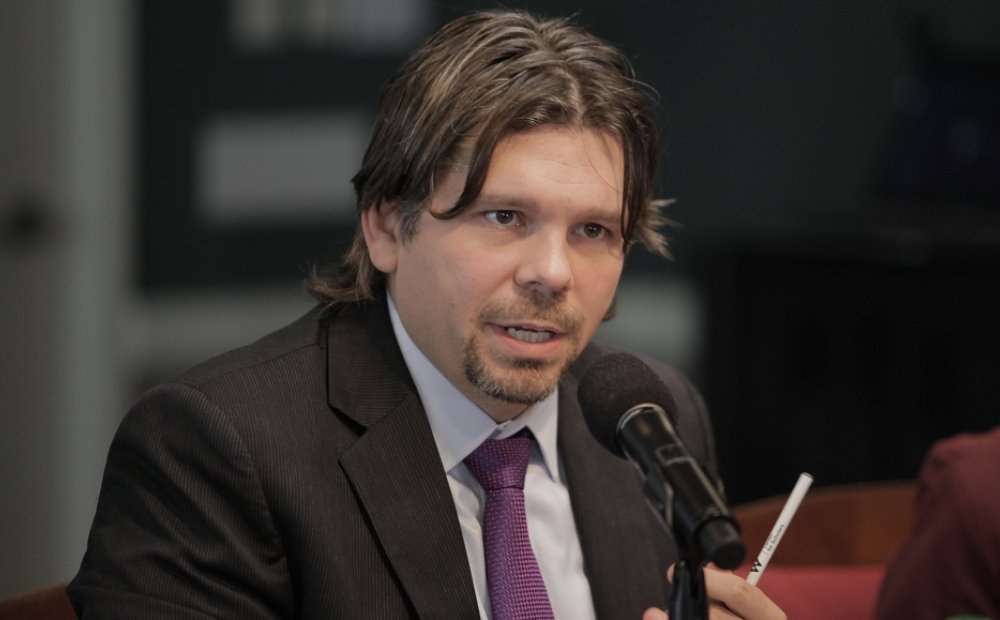Adaptable Autocrats: Regime Power in Egypt and Syria

Joshua Stacher, Fellow at the Woodrow Wilson Center and Assistant Professor, Department of Political Science, Kent State University, discussed his recent book on why uprisings against Mubarak and Assad differed so greatly.
On October 22, the Middle East Program hosted a book talk, “Adaptable Autocrats: Regime Power in Egypt and Syria” with Stacher. Haleh Esfandiari, Director of the Middle East Program at the Wilson Center, moderated the event.
Focusing on why Egypt’s uprising lasted only eighteen days while Syria’s has so far lasted twenty months, Stacher argued that the structure of the regime in each country determined its ability to adapt to unrest. “If you have centralized executive authority,” as Egypt did, “you can more easily adapt a ruling coalition” to react to popular mobilization, he said. However, “in Syria elites oversaw a more decentralized regime” that did not “maintain the ability to adapt.” Stacher likened the power structures in place in Egypt and Syria as a “pyramid” and a “Parthenon,” respectively. In Egypt, the “executive is autonomous from the state, and the state is autonomous from society,” which enables the regime to remove individuals from the power structure and replace them with new figures without destabilizing the overall regime. Once the ruling party “imploded” with the removal of former President Hosni Mubarak, the state apparatus was “broken but not disrupted,” which allowed new elites to emerge. By contrast, in Syria, President Bashar al-Assad is “not autonomous within the elite,” but, rather, “one of the equals” among the country’s power players. Such a structure hinders the regime’s ability to address protests by removing government members from office, lest they undermine all leadership positions. As such, the regime has acted by “collective decision” to preserve its overall authority.
Looking at long-term trends in national histories, Stacher found that such patterns of governance extend back for decades. He pointed to the changes made by Egypt’s Anwar Sadat after the end of Nasser’s presidency to purge the bureaucracy of employees too loyal to Nasser. In Syria, Stacher discussed its rocky history of coups and how this led to the formation of various “pillars” of regime security that sought to prevent revolt among elites by making sure all factions were equally strong. However, this decentralization of power led to “governance gridlock” in which it became exceedingly difficult to appoint or remove any one official without disrupting the overall system, limiting coalition change. In more recent history, Egypt’s former Foreign Minister Amr Moussa—although he had an “appearance of autonomy” within the government—lost all power among local elites when Mubarak removed him from his position in 2001 without any resistance from other members of the regime. By contrast, Syria’s handling of UN Security Council resolution 1483—addressing sanctions on Iraq—showed how much less authority al-Assad held among his peers when Syria abstained from the vote because the delegate could not decide whether to obey the voting orders of his President or his Foreign Minister. Stacher concluded from this that Syria’s decentralized elites can allow conflicting interests to emerge in “non-regime-threatening situations,” but group together when faced with “existential threats” to the system as a whole.
In sum, Stacher’s “counterintuitive” model, which he proposed applying to the rest of the Arab world, argues that in a more centralized government, such as Egypt’s, “the centralized executive becomes replaceable” because more of the government relies on internal hierarchies. In a decentralized system, such as Syria’s, the leader “becomes indispensable”—his removal threatens the balance of the regime structure, as he is merely another part of the broader “house of cards.”
By Laura Rostad, Middle East Program
Speaker

Assistant Professor of Political Science, Kent State University
Hosted By

Middle East Program
The Wilson Center’s Middle East Program serves as a crucial resource for the policymaking community and beyond, providing analyses and research that helps inform US foreign policymaking, stimulates public debate, and expands knowledge about issues in the wider Middle East and North Africa (MENA) region. Read more
